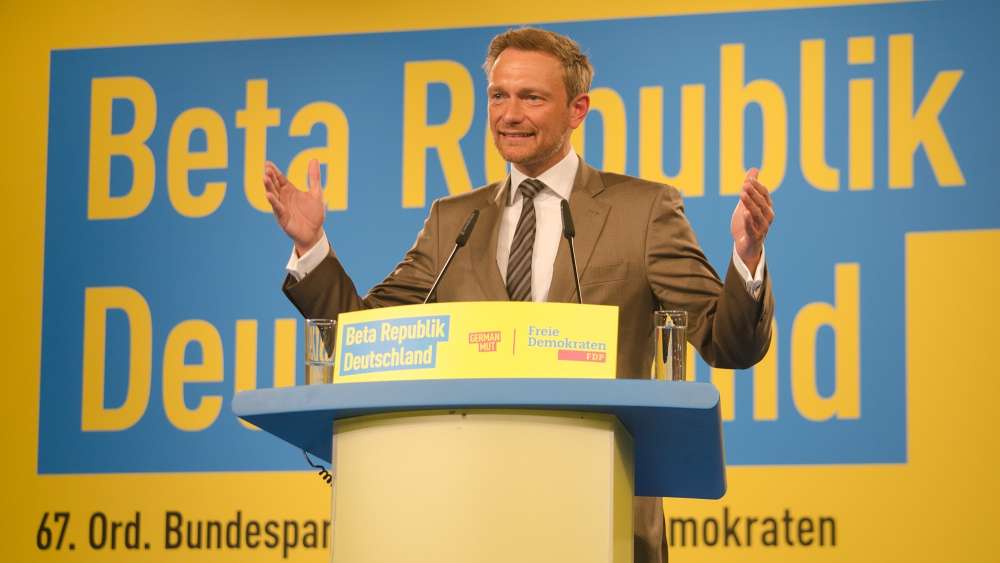German Liberals: Better Off in Opposition

The failure this week of negotiations over a four-party “Jamaica” coalition in Germany has a face: Christian Lindner. It was the 38-year-old leader of the pro-business Free Democratic Party (FDP) who pulled the plug and decided to walk away just before midnight on Sunday.
Leaving his stunned negotiation partners behind, he read a prepared statement into the TV cameras that it was “better not to govern than to govern in the wrong way.” Just a few minutes later the FDP social media operation distributed illustrations of this slogan. His final act on Sunday bore all the hallmarks of a carefully planned staging.
Indeed, Lindner has very good reasons to not join a four-party coalition just after he managed to lead the FDP from the political wilderness back into parliament. He has sought to re-brand the FDP as a party with clear principles, delineating core demands that the FDP would pursue: investing in education, promoting digital transformation, lowering taxes, blocking an EU “transfer union” and controlling immigration. After a compelling campaign, the party re-entered parliament with 10.7 percent of the vote.
Lindner had little time to savor his victory. Not only was his triumph overshadowed by the 12.6 percent showing of the right-wing Alternative for Germany (AfD). The refusal of the Social Democrats to consider another coalition with Chancellor Angela Merkel’s CDU threw the FDP straight into negotiations to form an unruly four-party coalition government with the CDU/CSU and the Greens. It’s an arrangement that would have forced the FDP into painful compromises on some of its signature campaign issues.
During the negotiations, Lindner secured some wins. He secured, for example, an agreement to partly abolish the “solidarity tax” for re-building East Germany that was introduced after the fall of the wall. But overall it would have been difficult for him to sell the inevitable compromises of a Jamaica coalition as a big win for the FDP.
On education, the CSU remained opposed to any meaningful authority for the federal government (as opposed to the state level). On digital transformation, it would have been hard for the FDP to lead, since the CDU has woken up to the importance of the issue. And as long as the Greens and parts of the CDU (with Francophile Peter Altmaier as possible finance minister) remained sympathetic to French President Emmanuel Macron’s proposals for eurozone reform, there would always be the danger that the FDP would be dragged toward more Europe.
So, Lindner very rationally concluded that the FDP is better served in opposition and that it has no reason to fear new elections. If a new election leads to another grand coalition, Lindner may have his preferred outcome after all: four years of an uncompromising opposition role (even if he will have to share that stage with the AfD).
That would likely work out well for Lindner. According to a recent poll, 32 percent of all Germans blame the FDP for walking out of the coalition talks. Linder’s personal approval rating dropped by 13 percent over the past three weeks. For many voters, the end to the coalition talks seemed to be a bit too carefully orchestrated. And the solo show of Lindner in front of the TV cameras reminded them of the “Me, Me, Me” egotist image that has been an integral part of the FDP brand. But Lindner only has to convince a good 10 percent of voters. And many will appreciate that he stuck to his guns and for once the party did not make compromises just for the sake of being in government.
Some commentators allege that this is all part of a plan to transform the FDP into a populist-nationalist party, a sort of “AfD light.” Lindner, the argument goes, is looking to follow in the footsteps of Austria’s Sebastian Kurz, who leveraged non-extreme right-wing sentiment to his advantage and will be Austria’s youngest ever chancellor.
To be sure, by stressing the need for an “orderly” immigration regime, the FDP sought to attract some voters turned off by Merkel’s refugee policy. But this alone is not a viable strategy. Medium-term, the CDU will not allow for the emergence of an FDP positioned to its right.
Lindner was able to score points on immigration because of Merkel’s still open flank on the issue. But that is just a very fleeting opportunity, given that reasserting control is the new CDU/CSU mantra on migration. And Lindner will not be able to move the FDP further toward the right without losing those in the party that have a pro-business or pro-civil liberties stance.
The FDP has a more unique role as a party championing a combination of fiscal conservatism, economic innovation and support for civil liberties. In the coming four years, Lindner concluded very rationally, it can best play this role in opposition.
Meanwhile, even those hoping for meaningful eurozone reform along the lines of what Macron has proposed should be pleased with Lindner’s decision. For them, it is better to have a German caretaker government than one with the wrong red lines.
…
This commentary was originally published by Politico Europe on November 24, 2017.







